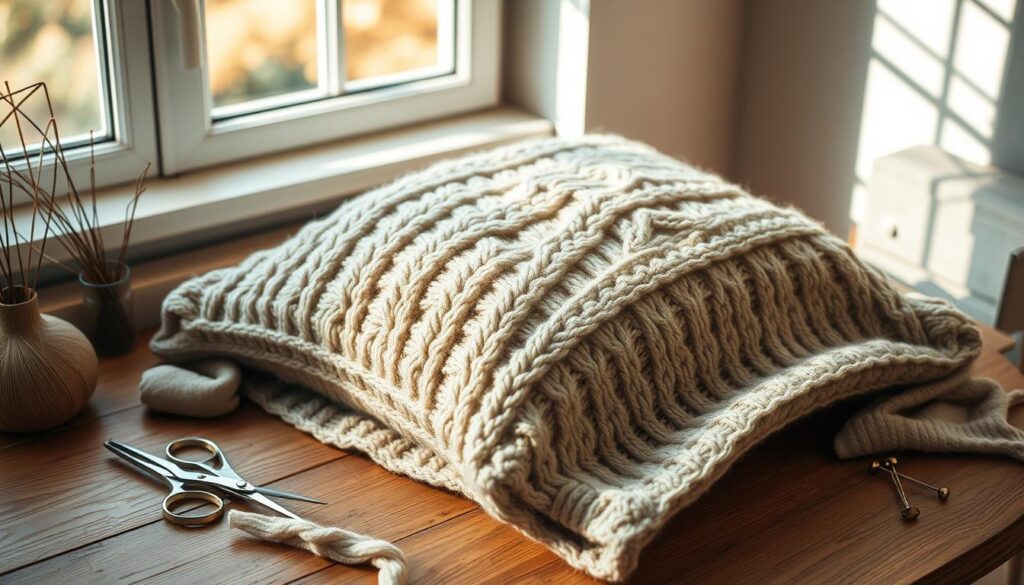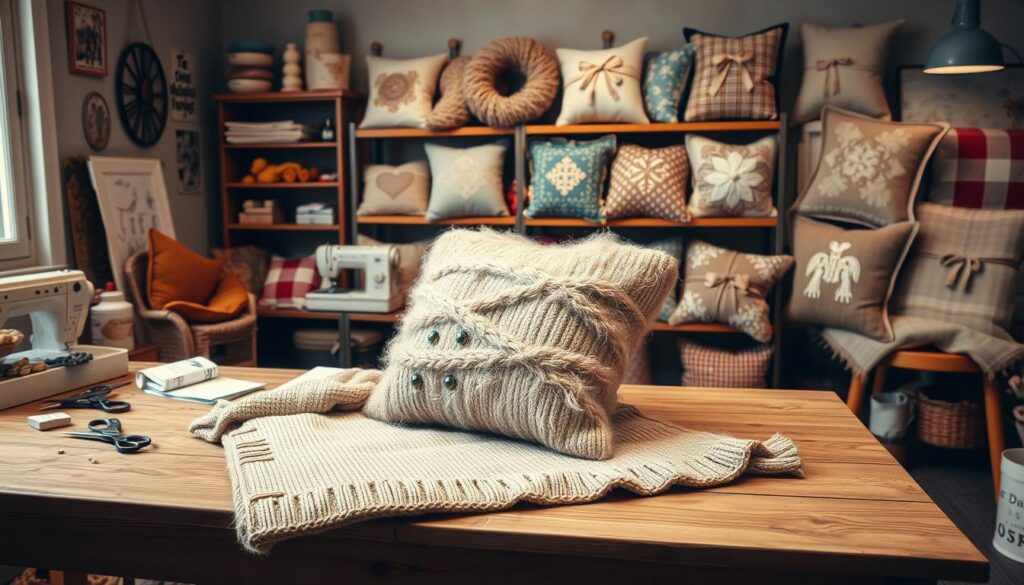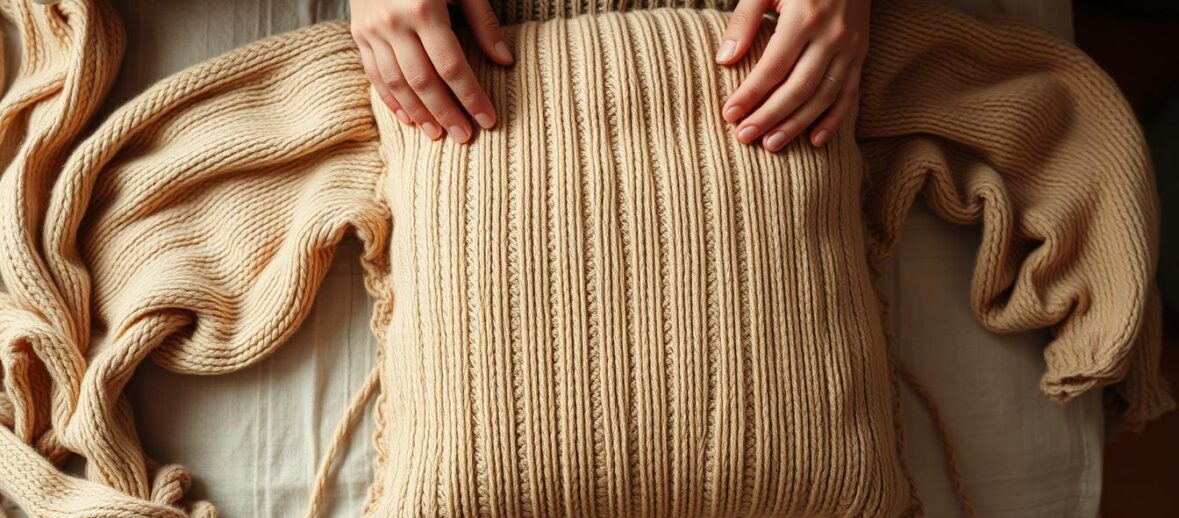Every winter, I’d look at my old sweaters and think about their future. That’s when I found out about diy pillow upcycling. It’s a way to give old clothes a new life as beautiful home decor.
Turn sweaters into cozy throw pillow covers and give them a new purpose. It doesn’t matter if it’s a special cable-knit from grandma or a sweater that’s too small. This project turns old clothes into art for your home.
With a few simple tools and some creativity, you can make pillows that make any room feel warmer and more personal. You don’t need to be a pro at sewing. Just be ready to get creative and give your old clothes a new look.
Key Takeaways
- Upcycle old sweaters into personalized home decor
- Reduce textile waste through creative recycling
- Create budget-friendly decorative elements
- Preserve sentimental clothing memories
- Learn basic DIY crafting skills
- Add unique texture to your living space
Essential Materials and Tools for Sweater Pillow Creation
Turning an old sweater into a cozy pillow is a fun project. It starts with the right materials to give new life to old clothes.
Before you start, gather the necessary items. They will make your pillow-making journey smooth and fun.
Basic Sewing Supplies
First, make sure you have these basic tools:
- Sewing machine (or needle and thread for hand sewing)
- Sharp fabric scissors
- Measuring tape
- Straight pins
- Fabric chalk or washable marker
Selecting the Perfect Sweater
Choosing the right sweater is key. Here are some tips:
- Look for sweaters with interesting textures or patterns
- Prioritize natural fibers like wool for durability
- Check for minimal wear and no significant holes
- Choose sweaters with enough fabric to cover your pillow form
Additional Materials to Gather
Complete your project with these extra items:
- Pillow form (16 x 16 inches recommended)
- Fiberfill (if making your own pillow insert)
- Coordinating thread
- Optional decorative buttons or patches
With these materials, you’re ready to turn an old sweater into a beautiful, eco-friendly pillow. It will add warmth and style to any room.
Preparing Your Sweater for Transformation
Turning your old wool sweater into a cozy pillow cover begins with preparation. Start by carefully taking apart your sweater. Lay it out on a flat surface, like a cutting mat, for accuracy.

For your wool sweater crafts, precise cutting is key. Here’s what to do:
- Wash and dry the sweater to prevent future shrinkage
- Use a rotary cutter for clean, straight lines
- Measure twice before making any cuts
- Cut straight across at the armpits for maximum fabric use
Different sweaters need different handling. Thick wool sweaters are more stable, while thin ones need extra care to avoid unraveling. Think about the sweater’s texture and weight when designing your pillow.
Pro tip: Don’t throw away any sweater parts. Sleeves and collars can add flair or be used in other projects. Be creative with every piece of your sweater.
Transforming an old sweater isn’t just about creating a new item—it’s about giving beloved clothing a second life.
Old Sweater Into Cozy Pillow Covers: Step-by-Step Process
Turning an old sweater into a pillow cover is a fun way to reuse clothes. It’s a great way to save money and reduce waste. Let’s explore how to make your sweater into a beautiful home decor item.
Cutting and Sizing Guide
First, pick the right sweater for your project. Measure your pillow, usually 16×16 inches. Add 1 inch to each side for seams. Here’s how to cut:
- Lay the sweater flat on a clean surface
- Use sharp fabric scissors for clean cuts
- Ensure the sweater’s design or pattern is centered
- Cut two identical pieces for the front and back
Creating the Envelope Closure
The envelope closure makes your pillow cover easy to remove and wash. Here’s how to do it:
- Cut the back piece 2 inches longer than the front
- Fold and hem the edges of the back piece
- Overlap the back pieces to create a clean closure
- Pin the pieces together, ensuring a snug fit
Adding Decorative Elements
Make your project unique with special touches. You can add:
- Vintage buttons along the closure
- Simple embroidery details
- Appliqué from matching fabric scraps
- Decorative stitching to highlight sweater texture
“Creativity is intelligence having fun” – Albert Einstein
Follow these steps to turn an old sweater into a cozy, personalized pillow cover. It will add warmth and style to your home while being eco-friendly.
Advanced Design Techniques and Embellishments

Take your sustainable home decor to the next level with creativity and expert techniques. Repurposing sweaters into pillow covers turns ordinary materials into stunning design statements.
Enhance your pillow design with these advanced embellishment strategies:
- Incorporate cable knit textures as focal points
- Mix contrasting sweater materials for unique patchwork effects
- Add decorative trims or vintage buttons
- Experiment with embroidery techniques
Seasonal variations can make your sustainable home decor truly special. Use holiday-themed sweater patterns or create themed pillow covers for different times of the year. A winter white cable knit sweater can become an elegant throw pillow. A bright summer sweater can create a cheerful accent piece.
“Creativity transforms the ordinary into something extraordinary” – Design Inspiration
Pro tip: When selecting sweaters, look for interesting textures, unique knit patterns, and high-quality fabrics. Wool, cashmere, and cotton sweaters are best for durable and attractive pillow covers.
- Aim for sweaters with minimal wear and tear
- Choose colors that complement your existing decor
- Consider the weight and stretch of the sweater fabric
Your DIY pillow project can become a stunning showcase of creativity. It also contributes to sustainable home decor practices.
Troubleshooting Common Issues
Upcycling wool sweaters into pillows can be tricky. But, with the right methods, you can make a stunning pillow cover. Knowing how to handle problems will help you achieve professional results.
Conquering Stretchy Knit Fabrics
Working with stretchy wool sweaters can be challenging. Here are some tips to help:
- Use a walking foot or dual-feed attachment on your sewing machine
- Select a ballpoint or stretch needle designed for knit fabrics
- Adjust machine tension to prevent fabric distortion
- Pin fabric carefully to minimize stretching during sewing
Preventing Fabric Fraying and Wear
To keep your pillow from fraying, follow these steps:
- Zigzag or serge raw edges to prevent fraying
- Apply fusible interfacing to reinforce delicate areas
- Use fabric glue on potential weak points
- Choose sweater fabrics with tighter knits for durability
Resolving Sewing Mishaps
Even pros face sewing problems. Quick fixes can save your wool sweater crafts project:
- For puckered seams, use a seam ripper and resew with reduced tension
- Misaligned patterns can be corrected by carefully repositioning fabric
- Uneven edges can be trimmed and re-sewn for a clean finish
Pro tip: Practice on scrap fabric before starting your main project to build confidence and skill.
Conclusion
Turning old sweaters into pillow covers is more than a craft. It’s a way to make your home eco-friendly. You give new life to clothes you might have thrown away.
Every sweater pillow has its own story. By using old clothes, you help the planet and make your home cozy. These pillows can make any room feel warmer and more personal, all while saving money.
Don’t stop with just one sweater pillow. Try different textures and patterns to show off your style. Whether it’s cable knit or merino wool, you can make something truly unique.
Begin your sweater pillow project today. It’s a fun way to be creative and make your home special. You’ll be reducing waste and making your living space more beautiful.


10 Responses
Only a smiling visitor here to share the love (:, btw great layout.
I’m still learning from you, as I’m making my way to the top as well. I certainly love reading all that is posted on your blog.Keep the information coming. I enjoyed it!
It’s perfect time to make some plans for the future and it’s time to be happy. I’ve read this post and if I could I wish to suggest you few interesting things or tips. Perhaps you can write next articles referring to this article. I want to read even more things about it!
hi!,I like your writing so much! share we communicate more about your post on AOL? I need an expert on this area to solve my problem. Maybe that’s you! Looking forward to see you.
I would like to thnkx for the efforts you have put in writing this web site. I am hoping the same high-grade blog post from you in the upcoming as well. Actually your creative writing skills has encouraged me to get my own site now. Really the blogging is spreading its wings fast. Your write up is a good example of it.
I was just looking for this info for a while. After six hours of continuous Googleing, finally I got it in your website. I wonder what is the lack of Google strategy that don’t rank this kind of informative websites in top of the list. Generally the top websites are full of garbage.
Some really terrific work on behalf of the owner of this internet site, perfectly outstanding subject matter.
Wow, wonderful weblog format! How lengthy have you been blogging for? you made running a blog look easy. The entire glance of your website is excellent, let alone the content!
This is very fascinating, You’re an overly skilled blogger. I’ve joined your feed and look forward to searching for extra of your wonderful post. Also, I’ve shared your website in my social networks!
so much excellent information on here, : D.